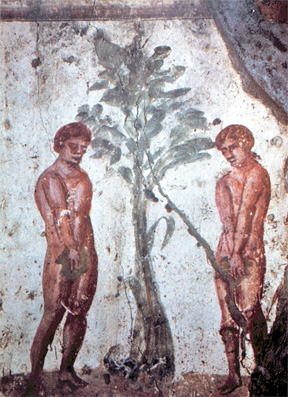In yesterday’s post, I claimed that, for Christians who are seeking a biblical perspective on illegal immigration, one of the best starting points in Genesis 1. This text reveals the unique identity of human beings as creatures who bear God’s own image. Thus each person is worthy of dignity and respect, and this includes all undocumented workers and others who are impacted by illegal immigration.
Genesis 1 provides another crucial cornerstone for our understanding of this issue. It comes after God creates man and woman in God’s own image: “God blessed them, and God said to them, “Be fruitful and multiply, and fill the earth and subdue it; and have dominion over the fish of the sea and over the birds of the air and over every living thing that moves upon the earth” (Gen 1:28).
Taken literally, the command to be fruitful and multiply has to do with making babies. That’s how the man and woman will fill the earth and subdue it. They will exercise dominion over creation through their children, grandchildren, great-grandchildren, and so forth and so on.
But the command to be fruitful suggests a broader notion of fecundity. When read in light of the rest of Scripture, we can see God’s intention for human beings to live fruitful lives in a metaphorical sense. God created us so that we might contribute value to his creation through our active stewardship. In a phrase derived from Aristotle and often heard these days, Genesis 1 provides a vision of divinely-intended “human flourishing.” Human beings, as bearers of God’s image, are to live fruitful lives. We are to use our talents and abilities to exercise stewardship of God’s creation. (Photo: A fruit stand near Tepic, Mexico. Photo by Tomas Castelzo. WikiCommons)
 How might this picture of fruitfulness/flourishing impact that discussion of illegal immigration? It shows us what God intends for all human beings, including, of course, undocumented workers. God wants us all to live fruitful lives, lives that make a difference, lives that contribute to the goodness of this world, lives of fulfillment. Yes, to be sure, sin complicates this picture. But God’s original purpose for humankind remains, and this purpose helps us to see the issue of illegal immigration from a distinctive Christian perspective.
How might this picture of fruitfulness/flourishing impact that discussion of illegal immigration? It shows us what God intends for all human beings, including, of course, undocumented workers. God wants us all to live fruitful lives, lives that make a difference, lives that contribute to the goodness of this world, lives of fulfillment. Yes, to be sure, sin complicates this picture. But God’s original purpose for humankind remains, and this purpose helps us to see the issue of illegal immigration from a distinctive Christian perspective.
The most important challenge and opportunity set before us is not border security or amnesty for illegal immigrants or deportation or reformation of our immigration system. Rather, the question posed by Genesis 1 is this: How can all the peoples of the Americas (and ultimately the world) live fruitful lives? To put it differently, how can those who inhabit these two connected continents fulfill the vision of Genesis 1:28?
To be sure, this is a giant question. But it is a question that should lie behind all Christian consideration of illegal immigration. Our ultimate concern is not just the well being of our nation, nor even just the well being of those who are in this country illegally, but rather the fruitfulness of all people, regardless of citizenship or status.
I’ll have more to say later about an implication of this concern, but, for now, I want to offer this goal of fruitfulness of all people as a corrective to what seems to be common in many conversations of illegal immigration. Those who “take the side” of undocumented workers often speak as if they care mainly or exclusively about the fruitfulness of these people. Those who are concerned about the well-being of the United States often seem to care about the fruitfulness of our citizens to the exclusion of others. A biblical perspective, I believe, inspires us to shape a world in which all peoples in the Americas (and beyond) would have the opportunity to lives truly fruitful lives.

